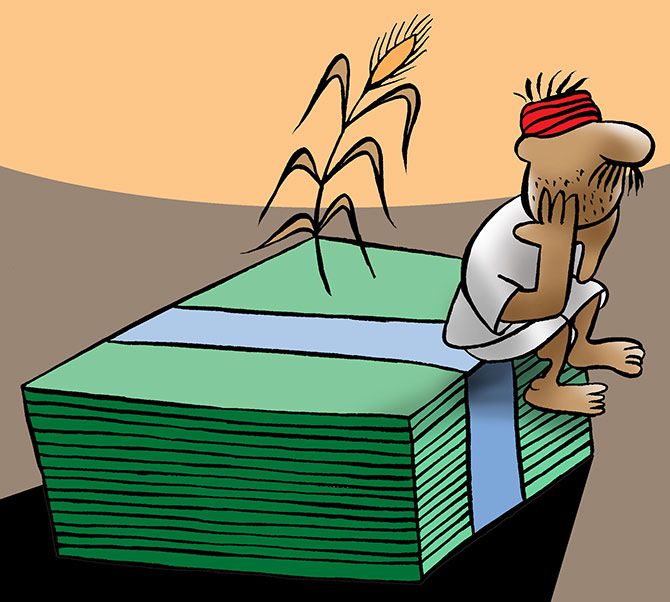Aiming to push India into the list of the top 10 agri export nations, the policy has been backed by the Prime Minister’s Office
Illustration: Uttam Ghosh/Rediff.com

Under attack from farmer groups for falling prices, the government on Monday unveiled an ambitious agriculture export policy that seeks to double agri exports to $60 billion by 2022 and do away with arbitrary curbs on exports.
However, the policy found little support from experts who termed the target ‘highly ambitious’, given how exports had fallen from nearly $40 billion five years back to $36 billion in 2017-18.
The aim to remove curbs on exports also didn’t find much traction. If previous experience is any indication, the government tends to clamp down on exports at the slightest hint of rising inflation, they said.
Aiming to push India into the list of the top 10 agri export nations, the policy has been backed by the Prime Minister’s Office.
Commerce and Industry Minister Suresh Prabhu said the policy ties in logistics support, a better trade regime, and states-led product development to connect farmers to global markets.
“Each state will have a designated department for promotion of agricultural exports, apart from cluster-based development for specific commodities. We have also identified several sea ports to serve as gateways for specific agri exports,” said Prabhu.
Despite India occupying pole position in global trade of these products, its total agri export basket still accounts for only a little over 2 per cent of world agri trade, estimated at a massive $1.37 trillion.
“Achieving an agriculture export target of $60 billion by 2022 looks ambitious, given the current global market conditions.
"More so, because India’s export basket largely comprises meat, marine products, and basmati rice whose demand in the world market is inelastic,” Gokul Patnaik, former chairman of Agriculture and Processed Food Products Export Development Authority, said.
Significantly, the policy mandates that the government finalise a list of essential agro-commodities. All commodities will see restrictions in the form of a minimum export price, export duty or bans revoked.
“This will help to stabilise export flows and stop friction between industries and the government every time production of a certain commodity fluctuates.
"Also, sudden changes in policy regarding shipment of onion, rice, wheat, oilseed, pulses or sugar have long-term impact on economic and foreign relations with many developing nations,” a senior commerce department official said.
On export ban on essential items, Patnaik said the world has moved away from a system of bans as people in importing countries want consistent policies.
“Instead we should look at fiddling with tariff to protect farmers. Also, our response to sanitary and phytosanitary measures by importing countries is outdated and needs sprucing up,” Patnaik added.
Industry insiders also pointed to the fact that the largest exports will inevitably fall within the essential category.
Case in point, cereals remain the largest category among agri products, currently totalling more than $8.1 billion, of which the staple grain of a majority of Indians - rice - makes up $7.8 billion.
India’s agricultural exports rose to $36.71 billion in 2017-18, after fluctuating over the previous two years.
It had stood at $39.33 billion five years back. However, the government is hopeful of a fast pickup in the export growth rate as the cost of logistics falls and investments in back-end infrastructure such as cold chains.
However, the commerce ministry points out that exports rose 9 per cent between 2007 and 2016. This is higher when compared to other major economies such as China (8 per cent), Brazil (5.4 per cent), and the US (5.1 per cent) between 2007 and 2016. On the other hand, India’s total agricultural imports stood at $24 billion in 2017-18, up from about $15 billion in 2013-14.
“There is no bold initiative in this policy and any hint of inflation will bring restrictions on exports which depress domestic prices, hurting the interests of farmers,” said former agriculture secretary Shiraj Hussain.
The government has estimated a total outlay of Rs 1,400 crore for agricultural exports.
This would be done by merging a myriad group of agricultural export schemes and incentives.












 © 2025
© 2025